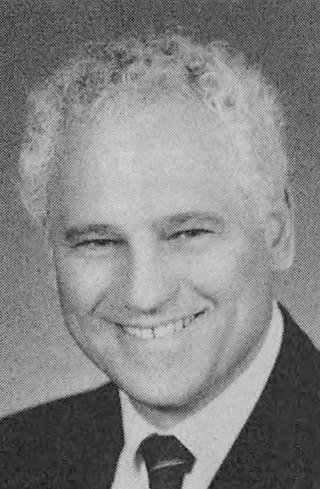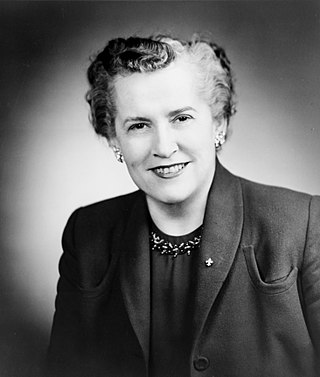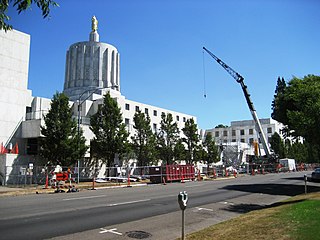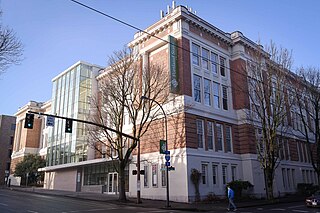The Oregon State Board of Higher Education was the statutory governing board for the Oregon University System from 1909 to 2015. The board was composed of eleven members appointed by the Governor of Oregon and confirmed by the Oregon State Senate. Nine members were appointed for four year terms; two members were students and appointed for two year terms.
The board was first known as the Oregon State Board of Higher Curricula and maintained that name from 1909 to 1929. [1] In 1929 the Oregon Legislature passed chapter 251, Oregon Laws 1929, that officially unified the state's public universities under the auspices of the newly renamed "Oregon State Board of Higher Education". [2] Part of that law abolished each public school's board of regents and created a nine-member State Board of Higher Education. [2] Becky Johnson, the first person whose appointment to a state Commission was subject to Senate approval, served on the Board from 1962 - 1975. [3]
Former Governor of Oregon Neil Goldschmidt was appointed and selected as the board's president in January 2004, [4] but the Senate confirmation process that approved his appointment also led to revelations of a decades-old sex scandal. Goldschmidt resigned from the board three months after his appointment. [5] Governor Ted Kulongoski took the unusual step of assuming the board presidency following Goldschmidt's resignation. [6]
The most recent addition to the Board was Jim Francesconi, former Portland City Councillor and mayoral candidate. He was confirmed by a vote of 28-1 in February, 2007, with Senator Vicki Walker casting the sole "no" vote, and Senator Rick Metsger absent. [7] [8] [9] [10]
Both the Oregon State Board of Higher Education and the Oregon University System closed permanently on June 30, 2015. [11] Most of the authorizations and programs of those two agencies were assumed by the Oregon Higher Education Coordinating Commission, which was formed in 2011 and expanded by the legislature in 2013 when independent boards were established for Oregon State University, University of Oregon, and Portland State University. [11] [12]

Theodore Ralph Kulongoski is an American politician, judge, and lawyer who served as the 36th Governor of Oregon from 2003 to 2011. A member of the Democratic Party, he served in both houses of the Oregon Legislative Assembly and also served as the state Insurance Commissioner. He was the Attorney General of Oregon from 1993 to 1997 and a justice of the Oregon Supreme Court from 1997 to 2001. Kulongoski has served in all three branches of the Oregon state government.

Neil Edward Goldschmidt is an American businessman and Democratic politician from the state of Oregon who held local, state and federal offices over three decades. After serving as the United States Secretary of Transportation under President Jimmy Carter and governor of Oregon, Goldschmidt was at one time considered the most powerful and influential figure in Oregon's politics. His career and legacy were severely damaged by revelations he raped a young teenage girl in 1973, during his first term as mayor of Portland.

Lars Kristopher Larson is an American conservative talk radio show host based in Portland, Oregon. Larson worked in television and radio news from the 1970s to 1990s and has hosted The Lars Larson Show from flagship station KXL in Portland since 1997. Two versions of the show exist: the Northwest show airs from 12 p.m. to 3 p.m. (Pacific) and discussing Pacific Northwest issues. The Northwest show is syndicated on the Radio Northwest Network which is owned and operated by Alpha Media. The nationally syndicated program airs from 3 p.m. to 6 p.m. (Pacific) and discusses national issues. The national show is syndicated by Compass Media Networks.

Vicki Lynn Walker is an American politician. She served as the Oregon State Director for Rural Development with the U.S. Department of Agriculture. A member of the Democratic Party, Walker previously served in both houses of the Oregon Legislature and briefly served as chair of the state's parole board. Walker is known as an advocate for utility customers and as an outspoken critic of influential former Governor Neil Goldschmidt.

The government of the U.S. state of Oregon, as prescribed by the Oregon Constitution, is composed of three government branches: the executive, the legislative, and the judicial. These branches operate in a manner similar to that of the federal government of the United States.

Norma Jean Paulus was an American lawyer and politician in the state of Oregon. A native of Nebraska, she was raised in Eastern Oregon before becoming a lawyer. A Republican, she first held political office as a representative in the Oregon House of Representatives, and then became the first woman elected to statewide public office in Oregon when she became Oregon Secretary of State in 1977. Paulus later served as Oregon Superintendent of Public Instruction for nine years. She made unsuccessful bids to become Governor of Oregon and United States Senator. Prior to her death on February 28, 2019, Paulus lived in Portland, where she was involved with several non-profit groups and sponsored a ballot measure to create open primaries in Oregon's statewide elections.

Edith Louise Starrett Green was an American politician and educator from Oregon. She was the second Oregonian woman to be elected to the U.S. House of Representatives and served a total of ten terms, from 1955 to 1974, as a Democrat.
The Oregon Health Plan is Oregon's state Medicaid program. It is overseen by the Oregon Health Authority.
The State Accident Insurance Fund Corporation (SAIF) is a not-for-profit, state-chartered workers’ compensation insurance company in the U.S. state of Oregon. It provides workers' compensation insurance and workplace safety services for Oregon employers, and claim management for injured workers. It is based in Salem, Oregon.

Brad Peter Avakian is an American politician who served as a Democrat in the Oregon House, the Oregon Senate, and as the state's nonpartisan elected Labor Commissioner.

The Seventy-fourth Oregon Legislative Assembly was the Oregon Legislative Assembly (OLA)'s period from 2007 to 2008. There was a regular session in 2007, and a shorter special session in 2008.

Mark Hass is an American politician from the US state of Oregon. A Democrat, he was the representative for District 14 in the Oregon State Senate from November 21, 2007, until January 10, 2021. He sought the office of Oregon Secretary of State in 2020.

Lincoln Hall is an historic building located in Portland, Oregon, built in 1912. It is the home of the theatre, film, and performing arts departments at Portland State University. It was originally home to Lincoln High School before becoming a part of the Portland State College in 1955.

The 1980 Oregon United States Senate election was held on November 4, 1980 to select the U.S. Senator from the state of Oregon. Republican candidate Bob Packwood was re-elected to a third term, defeating Democratic state senator Ted Kulongoski and Libertarian Tonie Nathan.
Electoral reform in Oregon refers to efforts to change election and voting laws in the West Coast state of Oregon.

The Sixty-Fourth Oregon Legislative Assembly convened for its regular session from January 12 to June 28, 1987, a total of 168 days.

Michael E. Dembrow is an American Democratic politician from the US state of Oregon, currently representing District 23 in the Oregon Senate. Before his appointment to the Oregon Senate, Dembrow served in the Oregon House of Representatives serving District 45. Dembrow, formerly an English instructor at Portland Community College, served on Governor Ted Kulongoski's State Board of Higher Education. The Oregon League of Conservation Voters and Willamette Week endorsed Dembrow during the 2008 legislative election.
Gail R. Shibley is an American politician who was the first openly gay person to serve in the Oregon State Legislature.
The Oregon State Board of Education sets standards and policies for public schools, from kindergarten through grade twelve, in the U.S. state of Oregon. The State Board of Education was established first in 1872. As defined by the Oregon legislature in 1951, the Board has seven members who are appointed by the Governor and approved by the Senate. The Board exercises oversight over 197 public school districts and 20 educational service districts.

Oregon's Emergency Board is a statutory legislative committee composed of members of both houses of the Oregon Legislative Assembly. It has broad powers to allocate general fund resources, lottery revenue, and other state funds for unanticipated government requirements when the state legislature is not in session. The board can authorize an agency to overspend its approved budget or approve a new budget amount for specific agency tasks. It can also authorize the transfers of funds between agencies or budget accounts. The Emergency Board is jointly chaired by the President of the Oregon Senate and the Speaker of the Oregon House of Representatives.